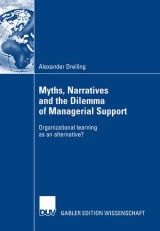Details

Myths, Narratives and the Dilemma of Managerial Support
Organizational learning as an alternative?|
53,49 € |
|
| Verlag: | Deutscher Universitätsverlag |
| Format: | |
| Veröffentl.: | 08.11.2007 |
| ISBN/EAN: | 9783835091085 |
| Sprache: | englisch |
| Anzahl Seiten: | 279 |
Dieses eBook enthält ein Wasserzeichen.
Beschreibungen
The importance of managerial support has been established for modern busine- related sciences at least as early as 1922. It was then in the ?rst issue of Harvard Business Review, that Wallace B. Donham called for a proper theory of business to avoid business to continue to be “unsystematic, haphazard, and for many men a pathetic gamble.” The past century witnessed signi?cant development in terms of theory. Common examples attracting considerable attention for scienti?c enquiry are decision theory, knowledge management and transfer,or organizational learning. Each set of theories focuses aspects of managerial work. Methods and tools based upon decision theory are concerned with ?nding one appropriate course of actions amongst a myriad of possibilities. Knowledge management methods and tools - sentially seek to conserve and transfer expert knowledge so that repetitive errors can more easily be prevented and repeating success more easily be achieved. - nally, methods and tools building upon the notion of organizational learning aim at signi?cantly lowering the resources involved in creating experts. I focus organizational learning for two main reasons: Firstly, learning is an “- avoidable” phenomenon. Learning does not have to be pursued as an additional activity to daily responsibilities. It is thus not the question if managers learn but what they learn and how this learning process can be directed. Secondly, a new dimension of criticism emerged from postmodern discussions of knowledge m- agement or decision making, which at least hints at the need to investigate other mechanisms for supporting management.
Exposition.- Foundations.- Application.- Construction.- Conclusions.
Dr. Alexander Dreiling promovierte bei Prof. Dr. Jörg Becker am Lehrstuhl für Wirtschaftsinformation und Informationsmanagement an der Universität Münster. Er ist als Senior Researcher bei SAP in Brisbane, Australien tätig.
With the advent of modern organization science, management science, computer science, and information science, the provision of information to the management of organizations has become a central object of investigation. The “right” information at the “right” time is typically perceived as being of paramount importance for managing an organization properly.<br>
<br>
Alexander Dreiling investigates which information should be provided to management in order to prepare managers to make better decisions and act accordingly. Based upon Argyris' and Schön's theory of organizational learning, managers are continuously supplied with information on the basis of whether and how well they have achieved their objectives. If they detect a mismatch of expectations and outcomes, they can in turn adjust their actions. The author first introduces the learning concept, before he turns to developing a method which can be used in order to create “paradigmatically different” managerial reporting environments. The three case studies reveal application scenarios as well as limits of the method.<br>
<br>
Alexander Dreiling investigates which information should be provided to management in order to prepare managers to make better decisions and act accordingly. Based upon Argyris' and Schön's theory of organizational learning, managers are continuously supplied with information on the basis of whether and how well they have achieved their objectives. If they detect a mismatch of expectations and outcomes, they can in turn adjust their actions. The author first introduces the learning concept, before he turns to developing a method which can be used in order to create “paradigmatically different” managerial reporting environments. The three case studies reveal application scenarios as well as limits of the method.<br>
With the advent of modern organization science, management science, computer science, and information science, the provision of information to the management of organizations has become a central object of investigation. The “right” information at the “right” time is typically perceived as being of paramount importance for managing an organization properly.<br>
<br>
Alexander Dreiling investigates which information should be provided to management in order to prepare managers to make better decisions and act accordingly. Based upon Argyris' and Schön's theory of organizational learning, managers are continuously supplied with information on the basis of whether and how well they have achieved their objectives. If they detect a mismatch of expectations and outcomes, they can in turn adjust their actions. The author first introduces the learning concept, before he turns to developing a method which can be used in order to create “paradigmatically different” managerial reporting environments. The three case studies reveal application scenarios as well as limits of the method.<br>
<br>
Alexander Dreiling investigates which information should be provided to management in order to prepare managers to make better decisions and act accordingly. Based upon Argyris' and Schön's theory of organizational learning, managers are continuously supplied with information on the basis of whether and how well they have achieved their objectives. If they detect a mismatch of expectations and outcomes, they can in turn adjust their actions. The author first introduces the learning concept, before he turns to developing a method which can be used in order to create “paradigmatically different” managerial reporting environments. The three case studies reveal application scenarios as well as limits of the method.<br>


















